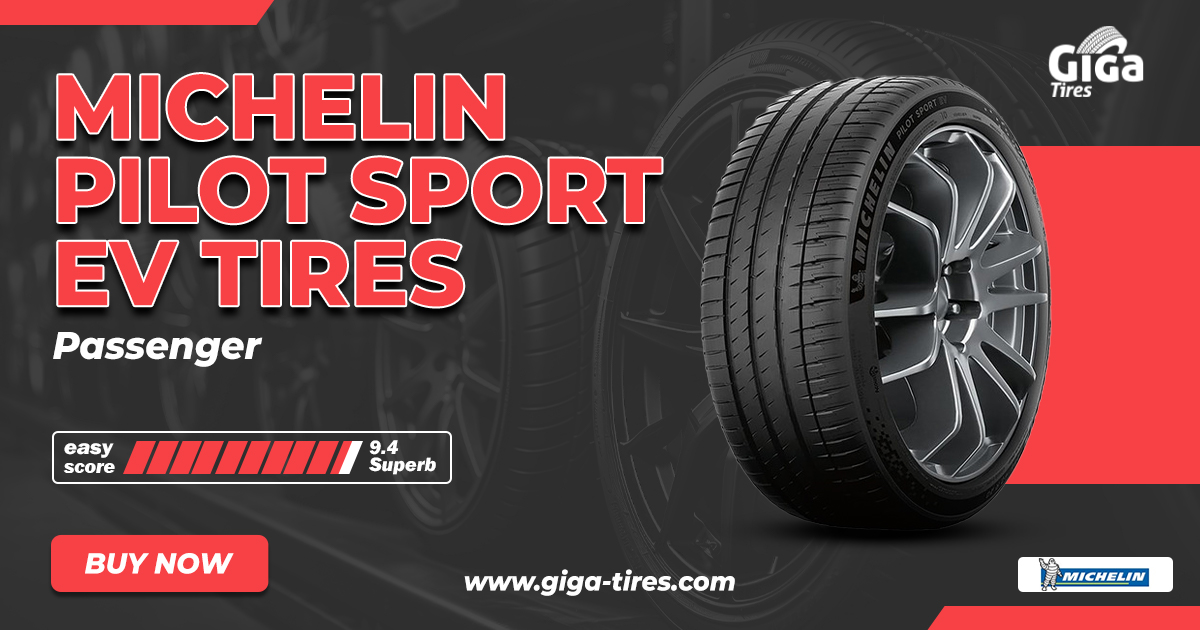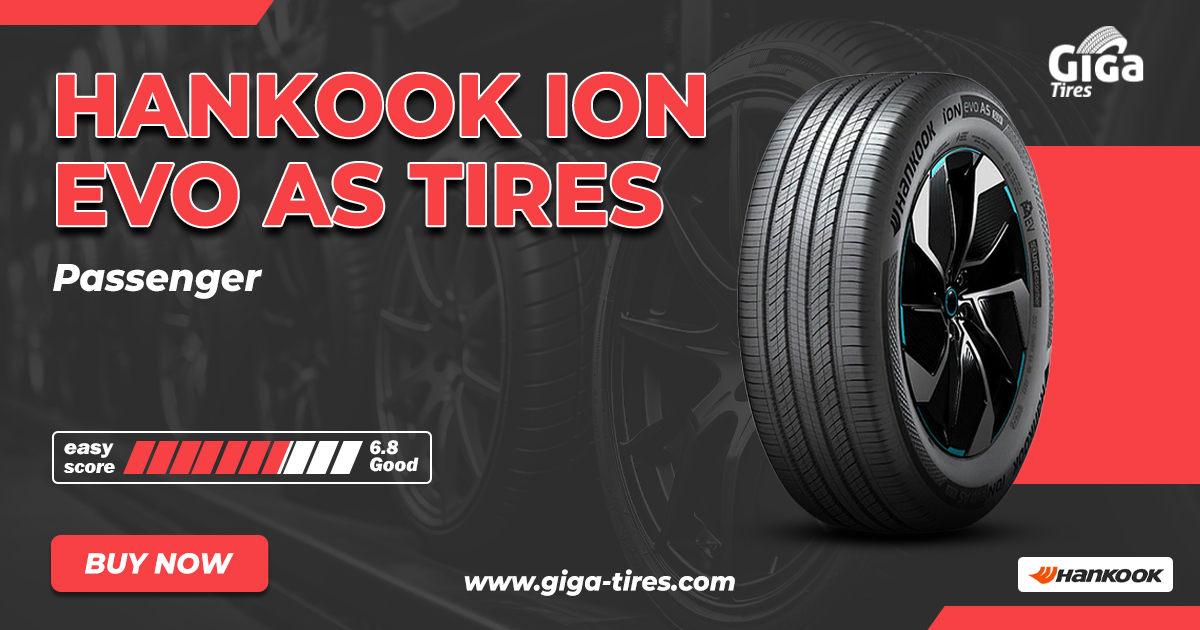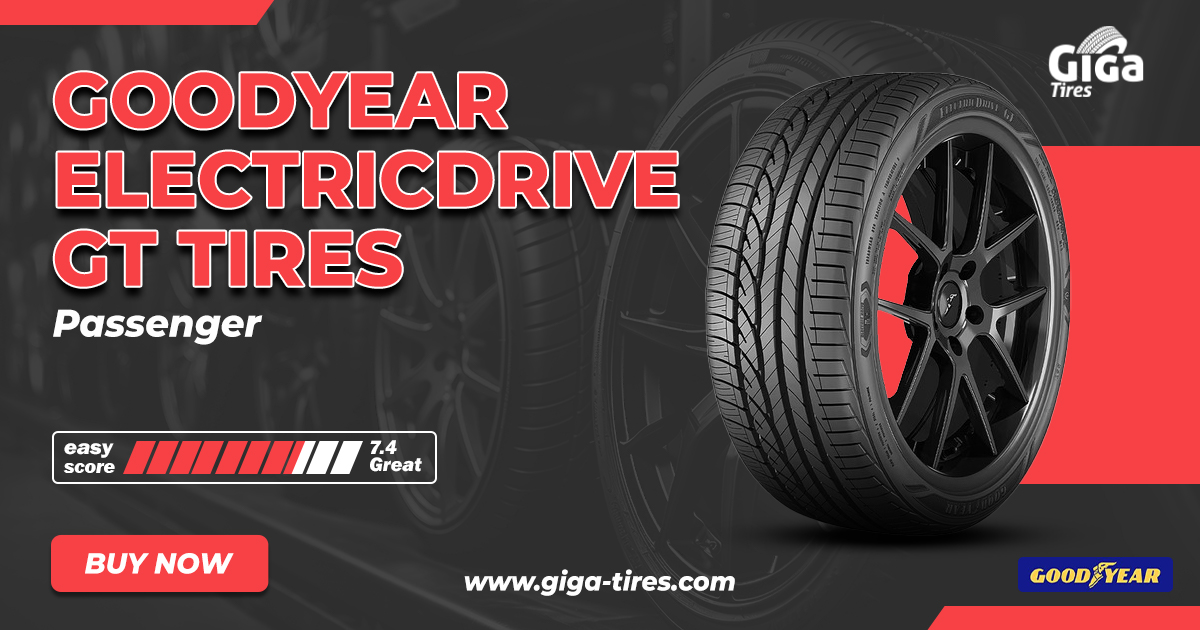Last Updated on 2 months
Electric Vehicle Tire Excellence
Electric Vehicles (EVs) are at the forefront of changing how we get around, offering a greener and more efficient option than traditional gas-guzzlers. In this piece, part of a more extensive blog post on Giga Tires, we are digging into the basics of electric cars. We will cover what defines them, how they work, the different types, the perks they bring, and the impressive growth of the EV market. Join us as we break it all down!
What is an Electric Vehicle?
An Electric Vehicle (EV) is a means of transportation propelled by electricity, which is the key feature that sets it apart from conventional vehicles that rely on gasoline or diesel engines. In contrast to traditional cars equipped with an internal combustion engine (ICE), EVs operate with an electric motor fueled by a rechargeable battery pack or, in some cases, a hydrogen fuel cell. This transition from fossil fuels to electric power signifies a notable advancement in efforts to decrease carbon emissions and diminish reliance on oil.
How does an electric vehicle work?
Unlike gasoline-powered vehicles, electric vehicles (EVs) do not use the traditional internal combustion engine (ICE) in favor of a powerful electric motor. This electric heart of the EV draws energy from a sizeable onboard battery pack, which acts as the vehicle’s fuel tank. To replenish this battery, plug your EV into a charging station or even a regular wall outlet, similar to how you charge your phone. Most EVs use cutting-edge lithium-ion batteries, which have superior energy density compared to other battery types. This translates to a more extended driving range, a longer lifespan for the battery itself, and the ability to deliver the high power needed to propel the EV efficiently. By replacing the ICE with this electric powertrain, EVs offer a cleaner, quieter, and more efficient driving experience.
What are the types of Electric Vehicles?
There are three main types of EVs. Hybrid Electric Vehicles (HEVs) use both an electric motor and a gasoline engine, the electric motor acting as the primary power source. While HEVs capture energy during braking to recharge their batteries and offer improved fuel economy, they still generate tailpipe emissions. Plug-in Hybrid Electric Vehicles (PHEVs) build upon the HEV concept by allowing external battery charging through stations or outlets, enabling extended electric-only driving, and reducing reliance on gasoline. However, PHEVs use a gasoline engine and related components for situations when the battery is depleted. Battery electric vehicles (BEVs) are the best for eco-friendly transportation. These zero-emission vehicles operate solely on electricity stored in a large onboard battery pack. BEVs require charging at external stations or outlets, and the battery capacity typically determines their driving range. Understanding these diverse EV options empowers you to choose the vehicle that best aligns with your driving habits, environmental goals, and access to charging infrastructure.
A Glimpse into Electric Car History
Did you know electric cars have existed for much longer than you might think? A clever English innovator paved the way for electric automobiles in 1884; by 1897, electric taxis were already cruising the streets of London. So, the concept of electric vehicles has a rich history! But a few things have remained the same through the times. Here are a few of them:
The Serenity of Electric Car Rides
The quietness of electric cars is one of their most apparent qualities. No matter the size, electric vehicles are always known to provide a peaceful driving environment. At faster speeds, you may hear some noise, but it is primarily external, and inside, it’s all about having a calm, enjoyable journey, whether behind the wheel or tagging along.
The Magic of Regenerative Braking
Another quality is that almost all EVs use regenerative braking. This clever technology collects energy every time the driver applies the brakes and then redirects some energy to recharge the battery. Not only does this add more miles to the proposed journey, but it also enhances the overall efficiency of the electric car.
Tires for Electric Vehicles
The selection of tires for electric vehicles holds paramount significance. Because electric cars differ from their internal combustion counterparts, choosing the right tires is crucial. This article explains why choosing appropriate tires for electric vehicles (EVs) is essential.
It answers whether or not EVs require special tires, describes the features of EV tires, and lists the variables that should be considered when designing tires for EVs.
Do Electric Cars Require Different Tires?
Tires designed specifically for electric vehicles offer several benefits, even though they may be fitted with standard tires. Due to the unique needs of electric cars, which include higher weight and torque, tires with improved qualities are required for the best results. Additionally, as EVs are frequently quieter than regular cars, the tires’ capacity to suppress noise becomes increasingly essential.
Importance of Choosing the Right Tires for EVs
Choosing the right tires is crucial for optimizing electric vehicles’ performance, economy, and safety (EVs). Unlike conventional cars, EVs present unique challenges for their tires due to two key factors: the instant torque delivery inherent to electric motors and the additional weight from the onboard batteries. These factors significantly strain EV tires, demanding specific qualities for optimal performance. Due to this, selecting the appropriate tire requires you to consider longevity, safety, and efficiency. Additionally, an electric car’s range can be significantly increased with the correct tires, guaranteeing optimal performance from the vehicle.
Characteristics of EV-Specific Tires
EV-specific tires are designed with several unique characteristics to address the needs of electric vehicles:
- Low Rolling Resistance: Low rolling resistance tires use less energy to sustain movement and increase fuel efficiency by lowering friction between the tire and the road. This is crucial to maximizing the range of an EV. Common rolling resistance tires require less energy to move to get more miles per charge.
- Enhanced Durability: Tires designed for electric vehicles (EVs) typically have more robust structures to support the additional weight and last longer because EVs weigh more than regular cars.
- Noise Reduction Technology: Because electric vehicles have no engine noise, tire noise is more audible. To provide a peaceful and comfortable ride, noise-reduction technology is often integrated into tires designed specifically for electric cars.
- Enhanced Traction: Electric motors have immediate torque, so these tires are often designed explicitly with superior traction to ensure optimal power delivery and effectively handle the strong starting force.
Remember, there are four factors you should consider when selecting an EV tire. But here are a couple more beyond that.
Factors to Consider in EV Tire Design
Several key factors are taken into account when designing tires for electric vehicles:
- Weight Management: Considering electric cars have significant battery packs, the tires must support the additional weight without compromising performance or safety.
- Energy Efficiency: Besides the general design, it’s equally important to prioritize designing tires that increase the vehicle’s overall energy efficiency. This entails optimizing tread patterns, materials, and tire structure.
- Traction and Handling: Since electric cars have rapid torque, the tire design must ensure excellent traction and handling to manage the power delivery and guarantee driver safety.
- Environmental Impact: With the focus on sustainability, tire manufacturers are also looking at environmentally friendly materials and production processes.
The performance and efficiency of electric vehicles are greatly dependent on their tires. When choosing tires for their electric cars, consumers can make more educated choices if they know the unique needs of EVs and the latest developments in tire technology.
Unique Demands of EV Tires
Compared to tires for standard vehicles, EV tires face a different set of difficulties. As a result of their giant battery packs, EVs weigh more; thus, their tires take on the extra weight. Additionally, tires with improved grip and traction are needed to manage fast acceleration without experiencing undue wear due to the immediate torque characteristic of electric motors. Tire noise is much more noticeable on EVs, emphasizing the necessity for noise reduction solutions in tire design.
Top 10 Tire Choices for Electric Vehicles
The choice of tires for electric cars (EVs) is crucial as EVs become increasingly popular in the automotive industry. Below are the best selections.
Best Tires for Electric Vehicles
1. Michelin e.Primacy
With its remarkable energy efficiency and longevity, the Michelin e.Primacy leads the way in the environmentally friendly tire market. It represents Michelin’s dedication to sustainable mobility and is ideal for drivers seeking to minimize their carbon footprint without compromising performance.
Performance with Electric Vehicles: The Michelin e.Primacy excels in reducing rolling resistance, which is critical to extending the range of an EV. It balances efficiency and durability, ensuring a safe and long-lasting ride.
Pros: It is an enhanced range with a long lifespan and consistent performance.
Cons: It may be priced higher than some alternatives.
2. Pirelli P Zero Elect
Pirelli P Zero Elect is a high-performance tire designed for electric and hybrid vehicles. It combines Pirelli’s renowned performance attributes with features tailored for electric powertrains, such as reduced rolling resistance and noise, providing a seamless and efficient driving experience.
Performance with Electric Vehicles: These tires are engineered for high-performance EVs, providing superior traction and handling. They also feature advanced noise reduction technology, making them ideal for luxury electric cars.
Pros: Excellent grip, comfortable ride quality, and quiet operation.
Cons: Premium pricing may be less widely available.
3. Continental ProContact TX Tires
The Continental ProContact TX isn’t just a tire; it’s a statement. It whispers “refined” on rain-slick asphalt, roars “confident” around corners, and hums “quietly efficient” on the highway. For drivers who crave a balanced blend of performance, comfort, and all-weather confidence, the ProContact TX is a symphony on four wheels.
Pros:
Excellent handling: The ProContact TX has a responsive feel and provides excellent grip in dry and wet conditions.
Comfortable ride: This tire is smooth and quiet, even on rough roads.
Long tread life: The ProContact TX is expected to last for many miles, making it a good value for the money.
All-season traction: This tire can handle weather conditions, including light snow.
Cons:
Price: The ProContact TX is a relatively expensive tire.
Not the best for off-road use: This tire is not designed for off-road driving and may need to perform better in deep snow or mud.
More sporty than competitors: Other options may be better if you want a tire with ultimate handling and performance.
The Continental ProContact TX is a great all-season tire for drivers demanding performance and comfort. It is a good option for those who drive in various weather conditions and offers several pros and cons.
4. Hankook Ventus S1 eco 3 ev
The Hankook Ventus S1 eco 3 EV is specifically designed to cater to the unique demands of electric vehicles. It offers enhanced efficiency, reduced rolling resistance, and lower noise levels while delivering the performance and durability expected from Hankook’s Ventus line. It is a perfect match for the eco-conscious, performance-oriented driver.
Performance with Electric Vehicles: Designed for modern EVs like the VW ID.3 and Porsche Taycan, these tires balance efficiency and durability with reduced rolling resistance and higher load capacity.
Pros: Good weight support, efficient energy usage, and reliable performance.
Cons: Limited options in terms of sizes and styles.
5. Michelin Pilot Sport EV
The Michelin Pilot Sport EV, a crown jewel within Michelin’s renowned Pilot Sport series, is tailor-made for electric sports cars. This tire goes above and beyond, providing a perfect combination of increased durability, enhanced grip, and a calm driving environment. It combines the distinct requirements of electric vehicles (EVs) with Michelin’s history of excellent performance, creating a seamless and thrilling driving experience.
Performance with Electric Vehicles: Tailored for electric sports cars, these tires deliver excellent grip and handling, catering to the performance-oriented EV driver.
Pros: Superior handling, excellent traction, and designed for high-speed stability.
Cons: Premium price point and may wear faster under aggressive driving.
6. Hankook iON EVO
The Hankook iON EVO is a groundbreaking electric vehicle tire market addition. Engineered with cutting-edge technology, it promises enhanced efficiency and durability, specifically tailored to meet the unique demands of electric vehicles. This tire is a testament to Hankook’s commitment to innovation, offering reduced rolling resistance and improved energy consumption, making it a top choice for environmentally conscious drivers seeking optimal performance.
Performance with Electric Vehicles: The iON EVO is renowned for its optimized tread design and compound that reduces rolling resistance, improving energy efficiency and range.
Pros: High energy efficiency, extended range, and excellent handling.
Cons: Limited availability and potentially higher cost.
7. GOODYEAR ElectricDrive GT
The GOODYEAR ElectricDrive GT marks a significant advancement in electric vehicle tires. Tailored to meet the specific needs of modern EVs, it offers a blend of high performance, longevity, and energy efficiency. Its design prioritizes delivering a responsive driving experience while catering to the unique characteristics of electric vehicles, setting a new standard in the tire industry for EV-specific products.
Performance with Electric Vehicles: These tires are designed for impressive performance with efficient braking and low rolling resistance, enhancing the EV’s range.
Pros: Improved energy efficiency, responsive braking, and durable design.
Cons: It may only be available in some regions and cost more.
8. Pirelli CINTURATO P7 (P7C2)
The Pirelli CINTURATO P7 (P7C2) represents a significant leap forward in sustainable tire technology. This tire is designed to excel in performance, particularly in wet conditions, and significantly reduce environmental impact. With its focus on fuel efficiency and a smaller carbon footprint, the P7C2 is an ideal choice for drivers who prioritize ecological sustainability without compromising safety and performance.
Performance with Electric Vehicles: This tire version offers improved handling and energy efficiency, making it suitable for balancing performance with sustainability.
Pros: Balanced performance, eco-friendly design, and good handling.
Cons: Premium pricing and may have limited size options.
9. BRIDGESTONE TURANZA EV
The BRIDGESTONE TURANZA EV is specifically designed to cater to the evolving needs of electric vehicles. It stands out for its exceptional handling, low rolling resistance, and reduced noise levels, which are crucial for enhancing the EV driving experience. This tire demonstrates Bridgestone’s commitment to developing specialized products that meet the unique requirements of electric vehicles, emphasizing efficiency, comfort, and performance.
Performance with Electric Vehicles: Recognized for their excellent grip and responsive handling, these tires are designed to enhance energy efficiency and extend the range of EVs.
Pros: Superior grip, energy-efficient design, and long-lasting performance.
Cons: It may have a premium price tag and limited availability in specific markets.
Choosing the right tire for an electric vehicle involves considering various factors, including performance, efficiency, and driving conditions. While these top-tier tires offer many benefits, they may come with higher costs and limited availability, underscoring the importance of careful selection based on specific EV needs and usage.
Maintenance of EV Tires
Proper maintenance of tires is crucial for any vehicle, but it becomes even more critical for electric vehicles (EVs) due to their unique characteristics. This comprehensive guide, part of a blog post for Giga Tires, outlines the essential aspects of maintaining EV tires, including tire rotation and alignment, inflation and pressure monitoring, tread inspection, and wheel balancing.
Tire Rotation and Alignment
- Tire Rotation: Electric vehicles often have different weight distributions than conventional cars, primarily due to the weight of the battery. This can lead to uneven tire wear. Regular tire rotation, usually every 5,000 to 8,000 miles, is recommended to ensure even wear across all tires. This not only extends the life of the tires but also maintains the efficiency of the EV.
- Alignment: For EVs, proper wheel alignment is essential. Uneven wear, a shortened range, and dangerous driving conditions might result from misalignment. Periodically checking the alignment is crucial, especially if you observe uneven tire wear or the car pushing to one side.
Tire Inflation and Pressure Monitoring
An electric vehicle’s performance and efficiency depend on its tires being inflated to the proper pressure. Underinflated tires may shorten the EV’s range since they increase rolling resistance. An unpleasant ride and decreased grip might result from overinflation.
EV owners should frequently check and fill their tires to the recommended pressure specified by the manufacturer. Tire pressure monitoring systems (TPMS) on many EVs notify drivers of noticeable pressure variations. Still, manual inspections are advised.
Tire Tread Inspection
Inspecting the tire tread is vital for maintaining safety and performance. The tread depth affects traction, especially in adverse weather conditions. Since EVs are heavier, they can wear down tires faster, especially if they deliver high torque.
Regular tread inspection for wear and tear can prevent accidents and improve vehicle efficiency. The legal minimum tread depth is 1.6 millimeters, but replacing tires before they reach this limit is advisable for optimal safety.
Wheel Balancing
Wheel balancing is crucial for the smooth operation of the vehicle. Imbalances can cause vibrations, leading to driver discomfort, increased tire wear, and strain on the vehicle’s suspension. EVs, being generally quieter, can make these imbalances more noticeable.
Balancing should be checked regularly when new tires are fitted. This process involves correcting mass distribution around the wheel and tire assembly to ensure a smooth ride.
Regular maintenance of EV tires extends their lifespan and ensures your electric vehicle’s safety, performance, and efficiency. It includes routine checks and services like tire rotation, alignment, pressure monitoring, tread inspection, and wheel balancing. Keeping up with these maintenance activities will help you get the most out of your EV tires, contributing to a safer and more enjoyable driving experience. Remember, well-maintained tires are as essential as the electric technology that powers your vehicle.
Conclusion & Recommendations
As we conclude our comprehensive guide on the various aspects of electric vehicles (EVs) and their specific tire needs, it is clear that the rise of EVs represents a significant shift in the automotive industry. There are special needs and things to consider with this move, especially when choosing and maintaining tires. It is impossible to emphasize how essential tires are to improving electric vehicles’ efficiency, safety, and range. To maximize your experience with electric cars, it is necessary to grasp every facet, from the various varieties of EVs and their market expansion to acknowledging the obstacles in their adoption and the significance of suitable tires.
Selecting the right tires for your EV is not just about aesthetics; it significantly impacts your driving experience. Factors like rolling resistance directly affect driving range, so purchase low-resistance tires like the Michelin E. Primacy to maximize mileage. EVs are also heavier, putting more stress on tires. Choose durable options like the Pirelli P Zero Elect for a longer lifespan. Since EVs lack engine noise, buy tires like the Continental EcoContact 6 that minimize road noise for a peaceful ride. Finally, don’t forget load capacity. If you frequently carry passengers or cargo, select tires designed for SUVs or trucks to ensure proper support and handling. By considering these factors and choosing EV-specific tires, you will experience a significant improvement in efficiency, safety, performance, and overall driving comfort compared to standard tires.
Furthermore, regular maintenance of your EV tires, including tire rotation, alignment, pressure monitoring, tread inspection, and wheel balancing, is essential. These practices not only extend the life of your tires but also ensure the safety and efficiency of your vehicle.
In light of these insights, it is evident that choosing the right tire and maintaining it properly is critical to optimizing your EV’s performance. Whether driving a high-performance electric sports car or a more traditional electric vehicle, the correct tires can make a significant difference.
Recommendations
At Giga Tires, we understand the importance of perfect tires for your electric vehicle. We offer a wide range of tires specifically designed for EVs, ensuring that you get the most out of your car in terms of performance, safety, and efficiency. Our selection includes top brands and models that are ideally suited to meet the unique demands of electric vehicles.
We invite you to explore our extensive collection at Giga Tires. Find the perfect match for your EV and enjoy a seamless, efficient, and safe driving experience. With our easy-to-navigate website and knowledgeable customer service, choosing the right tire has always been challenging.
Shop Now at Giga Tires – Your destination for the best EV tire selection. Let us help you enhance your electric driving experience with the perfect set of tires.
FAQs
What are the types of electric vehicles?
Electric vehicles (EVs) primarily come in three types: Battery Electric Vehicles (BEVs) that run entirely on batteries; Hybrid Electric Vehicles (HEVs), which combine a conventional internal combustion engine with an electric propulsion system; and Plug-in Hybrid Electric Vehicles (PHEVs) that can be recharged by plugging into an external source of electric power.
How many electric vehicles are available?
The availability of electric vehicles has significantly increased over recent years. Currently, hundreds of models are available globally, including sedans, SUVs, and trucks, with more being introduced regularly as technology and demand for sustainable transportation grow.
What sets EV tires apart from regular tires?
EV tires are specifically designed for the unique characteristics of electric vehicles. EV tires have lower rolling resistance: Less energy is lost through the tires, maximizing your EV’s driving range on a single charge. They are typically heavier than traditional gasoline-powered cars due to their batteries. EV tires are built to handle this additional weight and maintain optimal performance. Since EVs lack the engine noise of conventional vehicles, road noise is less noticeable. EV tires often incorporate noise-dampening technologies for a quieter, more comfortable driving experience.
What is different in an electric vehicle?
Electric vehicles differ from traditional vehicles in their power source. They use electric motors powered by rechargeable batteries, which leads to zero tailpipe emissions. Additionally, EVs have fewer moving parts, which often results in lower operating costs, and offer a quieter, smoother driving experience compared to conventional gasoline vehicles.
What is the most common electric vehicle?
In recent years, the Tesla Model 3 has emerged as one of the most common and popular electric vehicles. Known for its impressive range, performance, and advanced technology features, it has become a benchmark in the EV market for affordability and innovation.
What is the maintenance of an EV?
Regarding maintenance, electric vehicles (EVs) typically require fewer, less expensive procedures than conventional cars. It includes battery health checks, brake system inspections, tire maintenance, and software upgrades. Electric vehicles do not need oil changes, fuel filter changes, spark plug changes, or emissions monitoring.
What servicing is required for an electric vehicle?
Servicing an electric vehicle mainly involves routine inspections of the battery and electrical systems, brake pads, and tires. Regular software updates and ensuring the electric motor’s efficiency are critical aspects of EV servicing.
How often do you need to change tires on an EV?
Changing your EV’s tires depends on your driving style and the tires’ quality, although EV tires tend to wear out a bit faster than those in traditional gasoline-powered cars. This is because EVs are heavier due to their battery packs, and their electric motors deliver instant torque, putting more stress on the tires during acceleration. However, proper tire maintenance, including regular inflation checks and alignments, can significantly extend the lifespan of your EV’s tires.
Do EV cars need different tires?
Yes, tires made especially for electric vehicles typically provide benefits. These tires are often made quieter by reducing noise, supporting the extra weight of the EV with more excellent durability, and having a lower rolling resistance to maximize range efficiency.


















